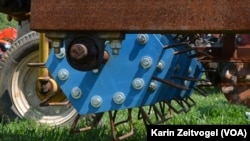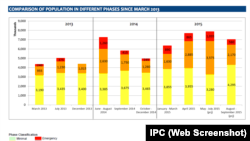Lawmakers in South Sudan's Northern Bahr el Ghazal state say they are still waiting for their share of the 1,000 tractors that President Salva Kiir bought last month and promised to distribute, free-of-charge, to all 10 states.
Santino Mayuat Ngong, who represents the constituency of Maper in the Northern Bahr el Ghazal state legislature, and Achak Thiep Thiep, the chair of the state's information and public relations committee, said that, even if the 76 tractors allocated to the state were to arrive immediately, they would be too late to be of use to farmers this year.
"People have already started cultivation," said Thiep. "When you transport the tractors from Juba to Aweil, they may reach Aweil after two, three weeks, which will be completely after the end of cultivation."
Expanding rice production
But state Agriculture Minister Lual Dau Marach said the tractors were expected to arrive in Aweil in the very near future, and as soon as they got there, they would be distributed to agricultural projects and farms around the state.
"Sixteen tractors are going to Aweil Rice Scheme... which is a national project in which we need to use those tractors. Last year alone, we produced 3,016 feddans of rice, so as soon as we receive those tractors, we expect more production of rice in Aweil Rice Scheme," Dau said.
A feddan is a unit of area used in Egypt, Sudan, Syria and Oman. Based on the area that a yoke of oxen can plough in a day, it varies from place to place.
The other 60 tractors that will eventually end up in Northern Bahr el Ghazal will be distributed to the five counties of the state, Dau said. Before farmers can use the tractors, they will attend training sessions to learn how to operate and maintain them.
Low-tech preferred
In the meantime, Dau said the state is focussing on teaching its farmers low-tech ways to boost productivity, including ploughing with yoked oxen.
"Recently in Aweil South County, we graduated about 750 ox-plough bulls that were trained in farming. These ox-ploughs are modern, they are very cheap, they will help our people and I feel like this ox-plow training is better and more suitable to our society -- more than tractors," he said.
Dau noted Northern Bahr el Ghazal has "a huge number of cattle" that could be trained to work with a plough, but few, if any, tractors.
President Kiir has said his mass-purchase of tractors was designed to do away with food insecurity by helping South Sudanese to grow more food to feed themselves.
National lawmakers are among the program's critics. When the purchase was announced in April, many were doubtful that distributing tractors around the country would help to solve the food crisis in South Sudan. An Integrated Food Security Phase Classification (IPC) report released Wednesday says South Sudan's food insecurity is going from bad to worse.
The IPC report projects that the number of people going hungry in South Sudan will leap from 2.5 million to around 4.6 million people in the next three months, and blamed the "deepening food insecurity" on "protracted conflict and insecurity which affected the planting season last year."





